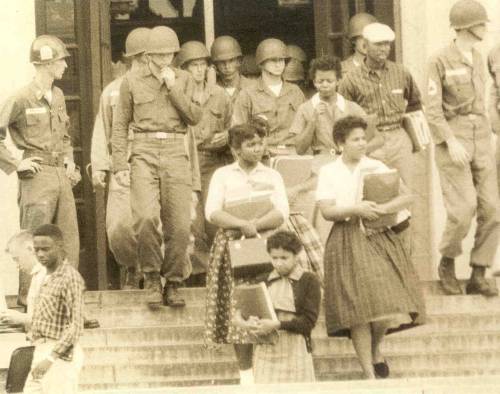The Brave Warriors of the Little Rock Nine
The struggle to end school segregation in 1957 and today
by Rebecca Lister

Troops accompanying members of the Little Rock Nine to Central High School
Armed guards in schools to protect children from violence…who would imagine it? It happened in 1957.
Several months ago, I heard an interview on NPR’s “Fresh Air” that still stays with me. The interview was with Melba Pattillo Beals. Beals was one of nine black students — famously known at “The Little Rock Nine” — who helped integrate Central High School in Little Rock, Arkansas. Though the Supreme Court had ruled against segregation in the 1954 ruling of Brown v. Board of Education, schools around the country had resisted it. In an effort to end school segregation, the Arkansas NAACP chose nine high school students to be warriors against the virulent opposition they would encounter as the first black high school students at Central High.
Beals has written several books about her experiences, including I Will Not Fear, March Forward, Girl, and Warriors Don’t Cry. In the NPR interview, Beals recounts in graphic detail some of the abuses she and her classmates suffered. Her harrowing stories tell of being spat upon, enduring raw eggs poured upon their heads, being hit in the back with tennis rackets, having lit matches thrown at them, even having acid sprayed in their faces…and these are not even close to a complete list. Beforehand, the group of teenagers received counseling and preparation, but nothing could have prepared them for the pure vitriol they encountered. “In order to get through this year, you will have to become a soldier. Never let your enemy know what you are feeling,” said one of the soldiers assigned to protect Beals.
With the help of her family and faith, Beals and her black classmates endured these hardships bravely. Her grandmother told her, “if you’re ever in a really tight place, understand that at every moment of your life, God is as close to you as your skin. You have but to pray, and God will show you that he’s there, and he will help you.” Beals prayed for God’s help many times during her time at Central, but she ended up not graduating from there. Only one of the nine ended up actually graduating from Central High. The others earned their diplomas elsewhere and went on to have illustrious careers; Beals herself had a distinguished career as a journalist for NBC.
I thought of this interview earlier this month when I was perusing the website of my teenagers’ high school. There, I saw pictures posted of senior prom night. The couples looked like most couples do on prom night— smiling, blissful, walking with hands interlaced. What struck me is how many interracial couples there were. African Americans, Asians, Hispanics and whites—who in 1957 could have ever imagined that these ethnic groups would come together, date and even fall in love? I found myself beaming as I looked at picture after picture of brown hands interlaced with white hands, brown cheek pressed to white cheek, and a rainbow of eyes sparkling.
We are tempted in 2018 to think that 1957 was a long time ago and to imagine that such things could never happen today. After all, we have laws that demand that our schools, stores, and movie theaters be fully integrated. Yet, to think that “separate yet equal” no longer exists is to ignore the work these teenage warriors did, and the work that still must be done in responding to continued racism in our country. When asked how she felt about the progress toward racial equality, Beals gave a sobering answer.
“…there is incredible progress that I sit here before this camera, this microphone, that I was a news reporter, that you’re interested in interviewing me regarding books which are on that topic, that people with white faces welcomed me here…Baby, don’t you ever forget that I rode in the back of the bus near the fussy, gassy engine. I drank from a water fountain marked color. Uh-uh. Don’t forget it. And I never, ever forget it. So I’ve come a long, long way.”
We have, too, but our way remains longer still. We must make our way, remembering the past, but gazing far in the horizon of the future. Perhaps some day, we will truly be able to live into the words of Paul in the letter to the Galatians. In it, he draws a vivid picture of what true equality looks like, whether racial, sexual,or economic: “There is neither Jew nor Gentile, neither slave nor free, nor is there male and female, for you are all one in Christ Jesus.”
Rebecca Lister is an associate professor of music at Lebanon Valley College in Annville, Pennsylvania.  Her passion is music and worship in churches. She has had several writings published in the academic field of music. She is currently an Inquirer in the Presbyterian Church under the care of the Carlisle Presbytery.
Her passion is music and worship in churches. She has had several writings published in the academic field of music. She is currently an Inquirer in the Presbyterian Church under the care of the Carlisle Presbytery.